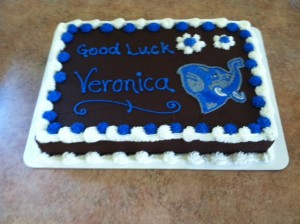As Douglas Adams said, "I seldom end up where I wanted to go, but almost always end up where I need to be." While anyone who knows me will attest that this quote certainly applies to my personal lack of direction, especially when driving, it also applies to my career path. I left college with a strong start in a career in retail at a major bookseller. Several years on that career path taught me patience, customer service skills, and that I didn't like working a job with crazy hours and no time off on holidays. After that I spent five years doing medical billing for a drug and alcohol treatment facility where I learned how to do really fast data entry and that I was really interested in record keeping practices. I also learned that when I started talking about how no one was writing letters anymore and that correspondence was shifting to email and wondered what that would mean for historians in the future, people would look at me funny. So I decided to go where people understood these concerns: library school.
The plan was my husband would work and I would go to school and take care of our 1 year old son. Things didn't go quite according to plan, and I found myself looking for a part-time job as well. And that's what brought me to where I needed to be - Tufts University Digital Collections and Archives. Well, technically it brought me to the American Antiquarian Society and the A New Nation Votes project, but the data entry work was being done at Tufts and I was interviewed by Anne Sauer, so let's leave it at DCA. I was so nervous for that interview. I had barely a semester of library school completed and I was just hoping that my undergraduate degree in history would make me a strong candidate. In retrospect, I really didn't need to worry since I had five years of previous data entry experience and I'm wicked fast and accurate. So there I was at the end of the following summer when a cadre of Simmons students went off into the world and there were openings for new grad school assistants. I transitioned from A New Nation Votes to DCA proper where I promptly processed my first collection of materials. It was one box and I spent two weeks on it. Yup, that was a bit of overkill there! So there I was again - not where I thought I wanted to be, but ABSOLUTELY where I needed to be. And that continued to the summer of 2007 when two brand new positions were added to the DCA staff. I was nervous applying since I still had a year of library school to finish, but the time I had spent in the department and the work I had done (I got faster than a box every two weeks) paid off. Anne took a chance on me, and gave me the flexibility to finish my classes.
Thus started six amazing years as the Records Archivist for the DCA. I can't begin to put into words how much I needed to be there as I started my career (which is a bit of bummer since this is a blog after all.) I have learned so much about the profession, about how to balance workloads and deadlines, and how to take the risks you need to take to make improvements in workflows and processes. I've also learned that something a professor told me when I was hired is absolutely true: in twenty or thirty years when the profession is looking back on the most innovative, daring, and influential archives at the start of the digital era, Tufts DCA will be the institution everyone talks about. That will be 100% because of the leadership of our director, Anne Sauer. She allows her staff the room to grow, to contribute, and to try the cutting edge. And she trusts us to not mess it up.
This post will get very long and I will start crying if I start listing all the wonderful people I have had the honor to work with in the DCA, so I will limit this to just one more person mentioned by name, our amazing University Records Manager, Eliot Wilczek. Eliot is a rock star in the archives profession. He doesn't believe it, but he is. While details were being worked out for my new job at the Mass State Archives, my new boss was talking to someone from another state archives. He couldn't say too much, but mentioned that he was working on getting someone from Tufts. The guy from the other state archive looked at him in awe and said, "You're getting Eliot Wilczek!" And Eliot is so awesome I can't even feel annoyed about that, because really, who wouldn't want Eliot working with them? So my parting present to Eliot is that I promise, in print, that I will never make "Eliot Groupie" ribbons to put on the Society of American Archivists conference nametags, even though EVERYONE would would want one.
So in closing, I guess I would say that I'm leaving not because I want to go so much as I know that my new job is where I'm supposed to be. Because I would be totally insane to WANT to leave the most wonderful colleagues I could ever hope for. I'm just so glad I can still call them my friends.
With much love and respect,
Veronica Martzahl








